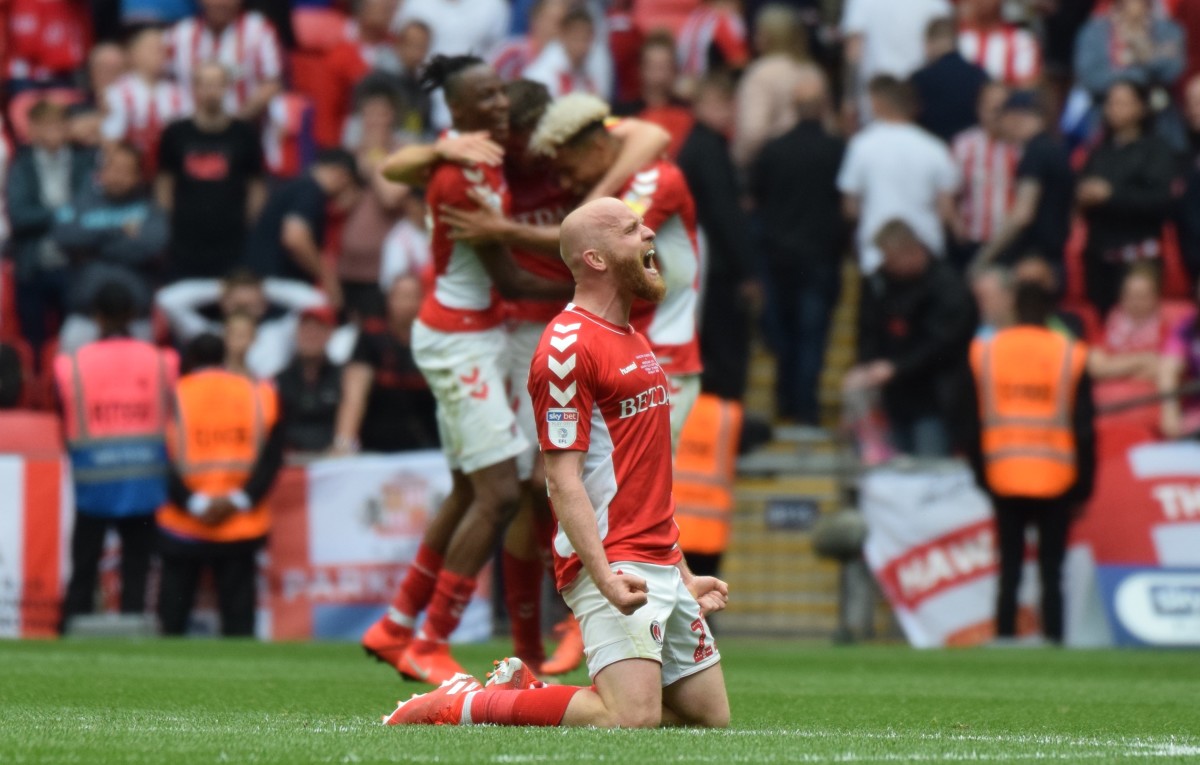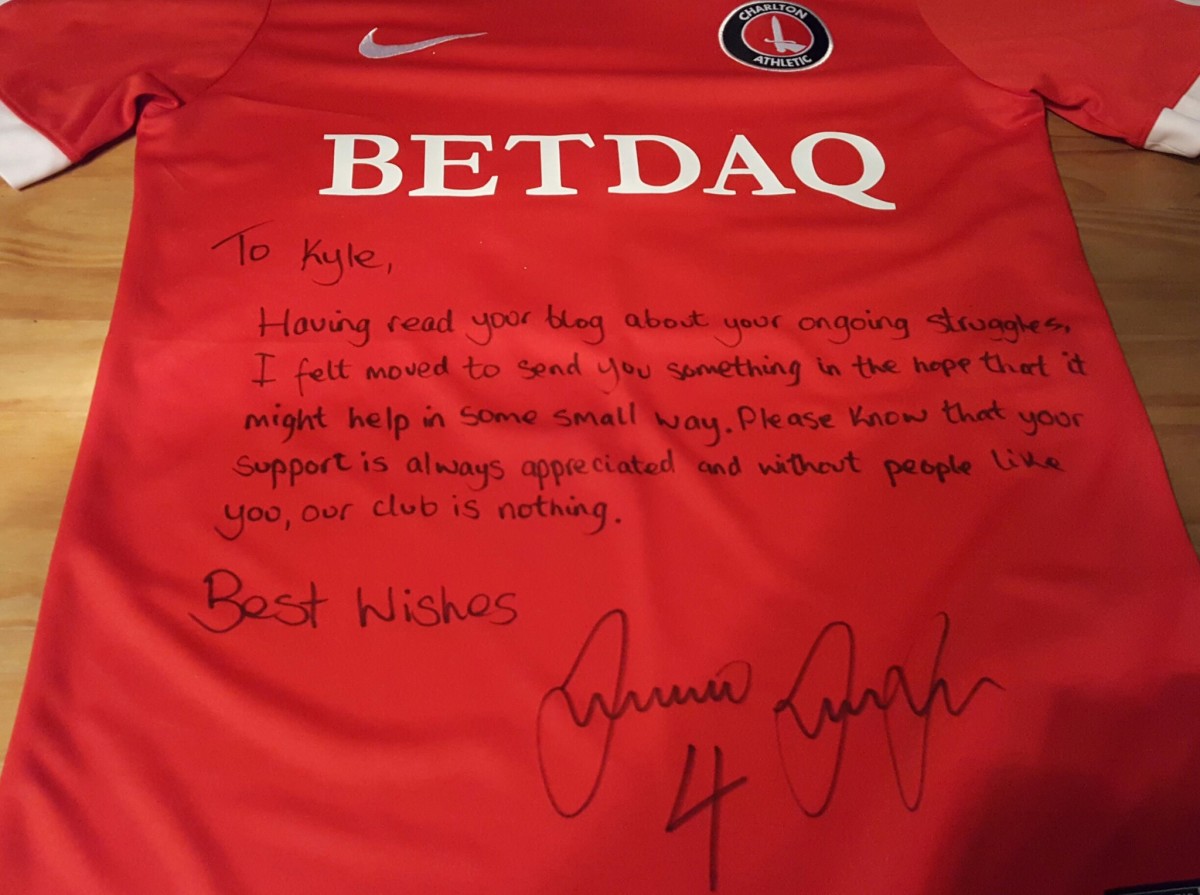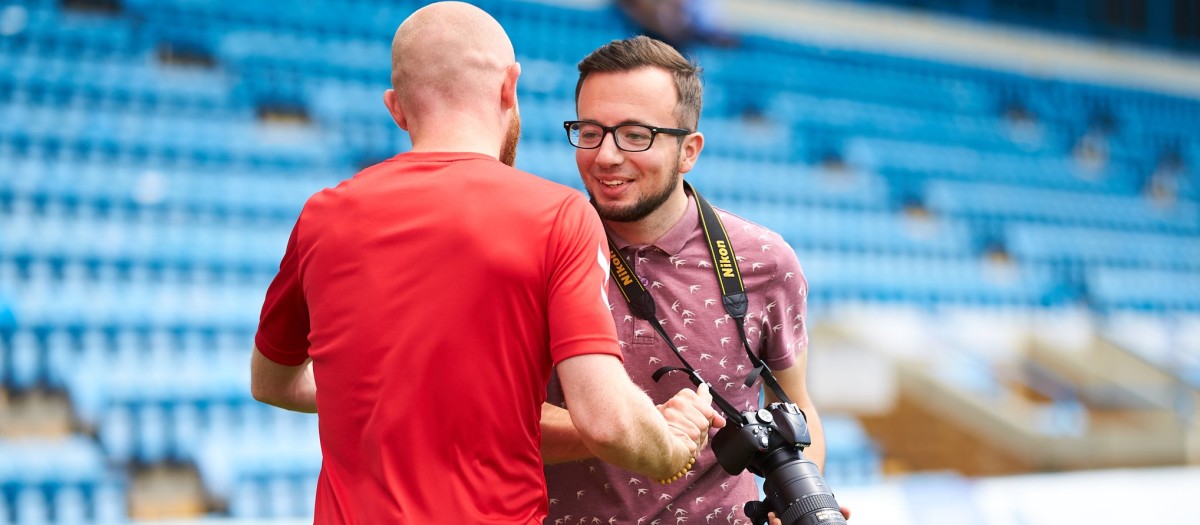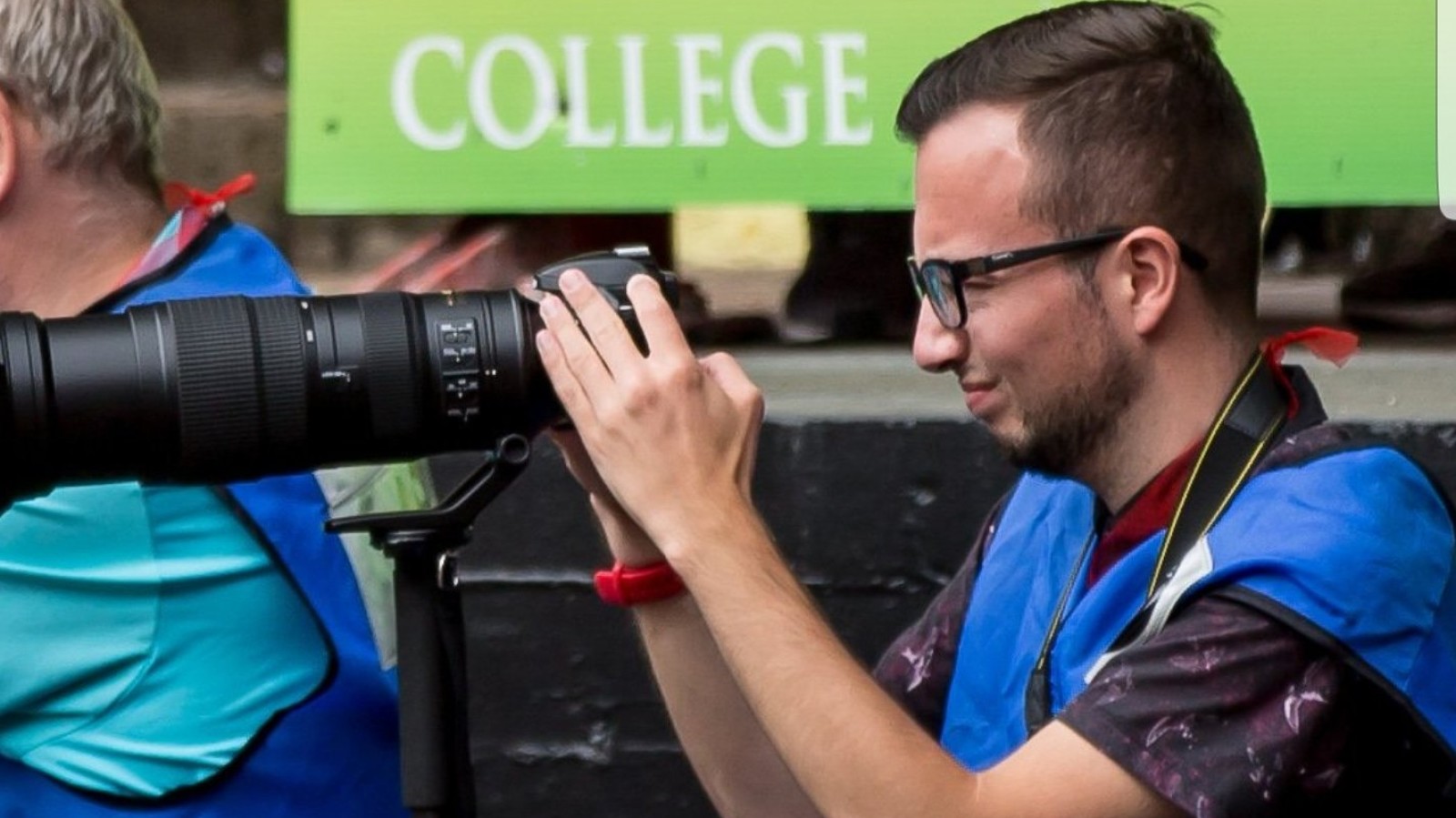Today is World Mental Health Day and we asked club photographer Kyle Andrews to talk us through his story.
Pride could only be taken from the photography pass that hung around my neck. Immeasurable enjoyment was all that could be felt as I looked back at my images of players wearing the shirt of the club I had supported since I was nine, that I’d been allowed to capture from the pitchside of the ground that I had held such a strong emotional attachment to for 13 years. All that could possibly follow from such a privileged experience was a renewed sense of belief in myself, my value and my life.
Pride, enjoyment and belief were not all that could be felt during my first time officially photographing at The Valley, however. They couldn’t be felt at all. They remained as absent as always from a mind being both crushed and controlled by mental illness, and the regular feelings of worthlessness, anxiety and loneliness grew unbearably greater.
An experience that was meant to offer hope in the darkest of times only confirmed hopelessness. If I could take no enjoyment from this wonderful opportunity, if the wounds that existed inside my fragile mind stung with greater intensity when I expected them to be soothed, then there would surely never be any escape from the trap I found myself in. Depression and anxiety were dictating my life, dictating me, and I was powerless to prevent it.
It meant that photographing Charlton Athletic’s FA Cup tie against Truro City in November 2017 was not the trigger for an escape from my suffering, but the trigger for an attempt to escape. Mental health problems had held a firm grasp of me for the best part of ten years, denying me any quality of life in more recent years as I felt obliged to hide from a society I feared taking any active part in, and now it was apparent there was only one way to break free. Two days later, tortured by isolation and hopelessness, I attempted to take my own life.
To now suggest that photographing at Charlton has laid a foundation from which I’ve been able to fight back against the mental health problems that so wish to keep me in captivity seems implausible. Implausible that any fight for a better and healthier life would be made at all during the days in hospital that followed. Even more so that my confidence and strength to fight would come heavily from the thing that had left me in a state of what seemed unfixable hopelessness, worthlessness and loneliness after my initial failure to extract any positives from it.
Even tiptoeing back down pitchside a few weeks later for a League One game against Peterborough United was an overwhelming challenge. One I took not looking for the positivity I had previously expected and been so crushed by its absence, but merely a way of moving on and not leaving The Valley permanently synonymous to me with those feelings that signalled the end. The Valley now stands synonymous to me with hope.
A transformation that started slowly, needing time to allow myself to enjoy this incredible, privileged opportunity to photograph the football club I support and not be plagued by fear. Gradually embracing the enjoyment and escaping the fear in order to photograph at every game both home and away. Ultimately becoming a part of an environment that has filled me with confidence, belief and a sense of self-worth so powerful that I’m able to exist inside it without the shackles of my mental health problems weighing me down as they do in all other areas of my life.
For it is not simply a case of extracting some enjoyment from the act of photographing Charlton games that has given me hope. It is the creation of an individual who I aspire to be each day, knowing full well I’m capable of being him, who isn’t shaped by mental illness. An individual shaped not just by myself in my effort to fight against my mental health problems, nor by the positive emotions that exist as a result of what I have achieved with my camera, but more than anything else by the people around me.
The greatest example of this comes from the unbelievable afternoon spent at Wembley in May. An incredible thrill to be there to capture Patrick Bauer’s stoppage-time, promotion-clinching, winner, but that is not the most powerful emotion I hold from that day. It is instead the sense of connection that came as I found myself with my camera at the heart of the post-match celebrations.
Connection with each player, supporter and member of staff that brought about an incredible feeling of worth. Someone who had spent so much time suffering alone, who was overwhelmed by isolation and worthlessness following his first attempt photographing at Charlton, now felt able to feel so strongly apart of something during an immeasurable moment of joy. That person who walked away from the game against Truro City crushed by hopelessness may well have been hurt by such an experience, unable to take any pleasure from this incredible moment and suffering immense pain as a result, but instead there stood a person on the Wembley pitch who had found an environment where he could live free of his ills.

There’s no question that I wouldn’t be able to hold such a strength of feeling without the kindness of those who have worn Charlton colours this season and last. Reaffirmed in the days after the Play-Off Final by a message from Lyle Taylor where he said that, though I may not kick a ball around with them, I was a part of the team. I felt it then and I feel it now.
Words that are so powerful when my mental health problems want me to believe I’m alone, unwanted and worthless. Words that are supported by the actions and gestures of those who represent this group of Addicks. There’s nothing I enjoy more than greeting the players as they take their first steps onto the pitch at an away game 90 minutes before kick-off, where hellos, handshakes and hugs reaffirm my acceptance, my worth, and that the connection I feel is genuine.
There’s been so many occasions where I’ve arrived at a game having spent the day, maybe even the week, beforehand overwhelmed by my struggles, only to be reinvigorated by the power of that connection. That aforementioned person that I aspire to be, that I know I can be, replaces the one shaped by his mental health problems. One that holds the confidence to do something as simple as talk and be comfortable around people, which I simply didn’t have at all before beginning this photography role.
Confidence that means I’ve been able to develop connections beyond those I have with those who play for the club with as great a significance. I feel such a great sense of worth from those who work for the club, partly because of the images I’m able to supply but also as an individual that has become a part of their team, too. I’ve built strong, talking relationships with people at the club, fellow photographers and fellow supporters that I couldn’t create outside of this positive environment that I feel apart of at Charlton.
And so too is there the joy and value to be had in my photography itself. It’s such a thrill to be able to capture a good image, and a source of pride to see my photos used by the club and players. When I’m so used to being overwhelmed by self-loathing, to be able to appreciate my own improvement and give myself praise for my photography, as well as earning the respect of others for it, is a wonderful feeling.
The power of all this in its ability to support me in my efforts to fight against my mental health problems is made greater by a sense of acceptance. These aren’t revelations to those who know me, to those who work for the club, to those who I talk confidently with who play for the club. It’s known I struggle in the way I do, but I’m not belittled, I’m not viewed with suspicion and I’m not outcasted as I fear I am or will be in many other situations.
Apart from being in this privileged position of taking photographs for the club, I’m not treated any differently. There is an acceptance and understanding that I value so greatly and cements this environment as one where I can exist without feeling overwhelmed by my mental health problems. Long before I started to photograph at The Valley, from a shirt arriving at my door from Johnnie Jackson with a message of support in 2016, I’ve never felt the need to hide who I am around the club; mental health has never been a dirty phrase.

In fact, it was a new face at the club this summer who provided some encouragement I desperately needed while going through an incredibly tough period that saw both overwhelming mental health difficulties and the passing of my nan coincide. A conversation with Tom Lockyer, only the second time I’d spoken to him, before the friendly at Dagenham & Redbridge reminding me I didn’t need to hide, that I certainly didn’t need to hide around anyone associated with Charlton, and that I remained capable of making positive steps forward. The progress I have made since then, supported by the conversation with Lockyer and my own belief in myself, has been encouraging.
In truth, it’s doing both myself and the impact everyone who has helped create this positive environment at Charlton has had on me a disservice if I don’t refer to the progress made since feeling nothing but hopelessness after that first photography experience. It is still true to say that I find my day-to-day life incredibly challenging, and my mental health still often dictates how I feel and what I’m capable of doing. That person I want to be and aspire to be still only truly exists in the environment at Charlton, but I have managed to extract elements from that person in order to confidently say that for the first time in many years I’m moving forward.

After three years of studying from home, preceded by two years of a soul-destroying experience of on-campus study that really took my mental health problems to their extreme, I began an on-campus master’s degree in Social Research at The University of Warwick last week. I’ve been overwhelmed by fear and anxiety at times, my mental health problems not giving me the space to settle that I hoped for, but I’ve extracted many positives and met some good people. There’s no way I would have been able to do that without the life-changing confidence that photographing at Charlton has given me, and there’s no way I would have been able to do it at all.
In fact, there’s probably no way I’d be here at all.
And so, I hope, to those reading this with difficulties of their own, that just two things can be taken. The first is to be open, honest and seek support where possible. Leading to the second point, which is that there are enough people out there, sometimes arriving in unexpected shapes and in unexpected situations, who understand and appreciate your situation for you to never lose hope of acquiring the acceptance that’s required to begin the fight against mental illness and drive towards extracting the confidence, connections and worth that so often feel absent.
I’m so grateful that my football club has been the place where I’ve found that support.
We’re proud to be working with Mind and the EFL on the ‘Goals Worth Talking About’ campaign. This World Mental Health Day, try and ask someone how they’re feeling. It could make all the difference. Whoever you support, Mind supports you. Visit Mind.org.uk.

